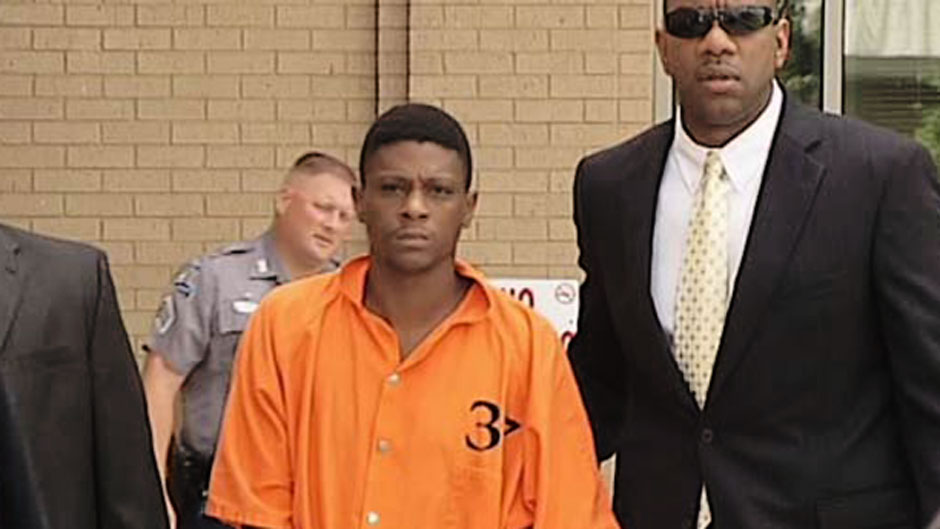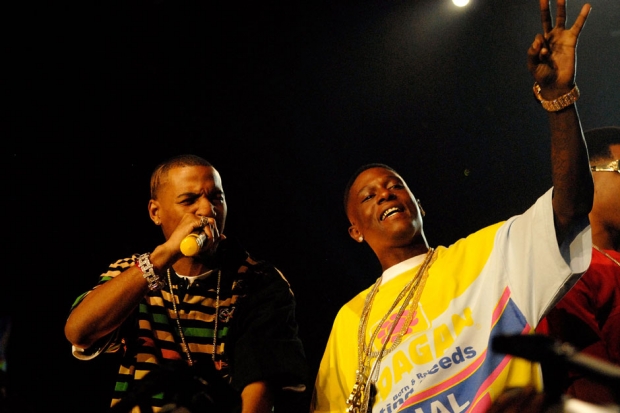One of the most controversial aspects of the murder trial was the prosecution’s use of Boosie’s music to try and establish a sinister frame of mind. He was accused of hiring 17-year-old Michael “Marlo Mike” Louding to shoot a man named Terry Boyd, who had been recently released from the penitentiary following a rape conviction. During the three-week court case, the jury heard Boosie tracks like “187” and “Bodybag.”
“The state painted my music wrong,” countered Boosie. “My music is violent, but not all of it. I have songs about God, my kids, and telling other people’s kids to chill out and go to school and do right. My violent music helps most kids avoid that street life because it scares them. My fans aren’t blind to the consequences.”
There’s also a caustic politics to his music. Shortly before his original incarceration in late 2009, Boosie recorded his own “Fuck The Police” and other songs attacking the Baton Rouge District Attorney’s office. His flashy lifestyle and celebrity didn’t do him any favors. Boosie is probably the most divisive and loved figure to come through the city since Huey Long — and the most successful since Shaq. During jury selection, you could scarcely find a candidate under the age of 30 who didn’t admit to bumping his music.
“When you get a black man who does more for the community than the public officials, people in those positions don’t like it. When you’re a black man living in homes they can’t afford, they don’t like that,” Boosie argued. “I was like a bug who didn’t want to go away for them. You turn on the radio you hear me. You turn on the TV you see me. When they heard their kids singing my songs that irritated some people.”
“In Baton Rouge, blacks have always been looked at differently from other races, and the blacks who are fortunate, don’t express themselves like I do. I don’t hold my tongue for nobody,” Boosie continued. “If I feel somebody is doing people wrong, I’m going to rap about it. For me to come out of one of the worst neighborhoods in Louisiana, South Baton Rouge, and to become successful off music they don’t agree with, puts hatred in people’s hearts. So when they got a chance to shatter my image, they tried everything in their power to turn me into a straight bad guy, a monster. It was crazy.”
Before first going to jail in November of 2009 for a third-offense marijuana charge, Boosie amassed one of the deepest catalogs of any rapper during the last decade. Though his only major national hit came from his appearance on a 2007 remix of Foxx’s “Wipe Me Down,” each of his three records for Asylum sold hundreds of thousand of copies. (He also released music via independent Trill Entertainment and his own mixtapes.) Not long before he was locked up, he bragged that he had a “Beatles catalog” of unreleased material to hold over fans during his absence. But the state confiscated his hard drives and won’t return them until Louding’s trial is concluded. Whenever that may be.
While unable to access a studio, Boosie maintains he’s been feverishly writing.
“I have about 500 songs at the moment. I’m ready to get in the studio with the best producers. I feel that I’m making the best music I’ve ever made. The more I go through in life the better my music gets and it’s been crazy the last three years,” Boosie reported. “I keep my music heartfelt and stick to making real music. I wouldn’t even say it’s hip-hop music. My music is ‘reality rap.’ Hip-hop music can make you dance and bob your head, but it can’t make you cry or touch your heart like reality rap.”
Boosie has reluctantly settled into his Angola routine: Insulin shots for his diabetes at six in the morning and three in the afternoon, then work and songwriting. At night, he writes letters to fans and reads his Bible, as well as the occasional rap magazine or novel. He’s also begun a memoir: The Truth, No Lies.
“It’s my life story from when I was born to the present day,” the rapper revealed. “I just felt the world needed to hear my life story so those who don’t understand certain things that I rap about, like the struggle, will understand that it’s the struggle that made me who I am today. I want people to know that it’s bigger than rap with me. I have a good heart. I want people who never took the time out to listen to me, to give me a chance.
There have been darker moments during the incarceration, including clashes with the infamously brutal guards.
“It’s been hard at times. Some guards hate me with a passion and it shows in some of the things I’ve been told and called. Some guards come to work full of hatred for inmates. I think they do that because their household is miserable or they’re just tired of working,” Boosie reasoned. “When I first got here, I was a ticking time bomb. I’ve been done bad by some guards, but there’s people here who have been done worse. They do have some cool guards here though. As far as inmates, I’m respected. It’s just like the streets — the real respect me and the fake are Boosie haters.”
The hardest part has been coping with long stretches away from his mother and seven children.
“I miss my family the most … my little boy waking me up and playing with my eyes … shopping for my little girls … being a daddy … being a son to my beautiful mama,” shared Boosie. “I miss my family having barbecues and all of us together laughing. The money, the fame, and the things that you get off success, I miss none of that like I miss being with my family.”
His goals upon release include: a record deal with a major label, distribution for his Bad Azz Entertainment imprint, a clothing line, magazine, cartoon, energy drink, endorsements, a diabetic foundation, and to keep giving back to impoverished communities. He also wants to start a program to help the wrongly convicted and launch a company to publish writing by prisoners.
“This experience has made me a lot wiser and to cherish life more. I’ve become more business-minded. I’ve become more focused on myself than others. I feel I’ve become a better son, father, brother, and I listen more than I used to,” Boosie said.
This month, his lawyers filed a motion to find out how much longer the state plans on keeping him in jail. It’s not an easy calculus and the local penal system is slow. The question is whether officials will determine that his eight-year sentence began in November of 2009, when he first entered prison, or May of 2011, when his murder trial began. There’s also the hope that time will be reduced as a result of his good behavior and earning his GED.
Whether he’s released this year or next, Boosie will still only be in his early 30s when he gets out, the prime of his career, with a raw story of redemption to tell.
“I’m just blessed to get another chance at freedom. Life dishes what you least expect at the time you least expect it. The test is how we respond to it,” vowed Boosie. “This situation forced me to look at things differently. I had to suffer to learn things about myself, those surrounding me, and God. He put me through this pain for me to come back stronger.”






